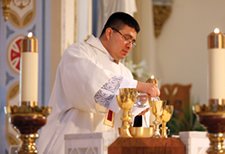
Deacon Oswaldo Sandoval was born in a remote part of El Salvador, the son of a farmer. After enduring years of war as a youth, he entered the United State in 1995 as a political refugee. He will be ordained to the priesthood on May 26 at the Cathedral of St. Peter in Kansas City, Kan.
by Joe Bollig
joe.bollig@theleaven.org
KANSAS CITY, Kan. — At heart, he’s a country boy who still loves farm life.
“I really do [like the farm],” said Deacon (soon to be Father) Oswaldo Sandoval. “When you plant the seed, and you see the plants grow up, it’s beautiful.”
Vocations to the priesthood are like that, too. The seed of Deacon Sandoval’s vocation was not planted in Kansas, however, but in a land far away: El Salvador.
Deacon Sandoval was born in 1977, in the small town of San Miguel in the Department of Santa Ana, located in the northwest corner of El Salvador.
His father Mario was a farmer, and his mother Dora Cervantes-Evallos was a farmer’s wife. They raised six boys, the youngest of them twins — Edwin and Deacon Sandoval. The family belonged to San Esteban (St. Stephen) Parish. Their lives were deeply grounded in faith.
“My family prayed the rosary daily,” said Deacon Sandoval. “I grew up going to church all the time, and it’s still part of the family.”
“I tell people,” he continued, “that my parents pray more than I did when I was in the seminary!”
A few years after Deacon Sandoval was born, the long-simmering tensions in El Salvador broke out into a 12-year civil war. The military-led government was opposed by a coalition of left-wing guerrillas.
It was a long, dirty war. Guerrilla raids and assassinations were answered by government death squad murders. Many people simply “disappeared.” Many fled the country.
Never having known a time of peace, civil war was “kind of normal” for Deacon Sandoval when he was a boy.
“Every morning, a group of soldiers would come and just drink the milk in the morning,” he said. “We gave them whatever they asked for. Sometimes they’d come in the night, asking for food.”
Two of his uncles were killed during the civil war, although the family never knew exactly what happened. Anyone could be killed for any reason — or no reason at all.
“One time, my father and some of my uncles, two brothers and cousins were coming back from the farm,” said Deacon Sandoval.
“A group of soldiers saw we were a big family and a lot of boys,” he continued. “They thought, ‘Oh yes, the enemy is coming.’ So one of the solders tried to throw a grenade, but it exploded in his hand, and he and three other soldiers died. My father and uncles carried the bodies.”
Deacon Sandoval had not yet completed high school when the violence and chaos in El Salvador led to his emigration to this country.
He entered the United States as a political refugee in 1995, and lived first in California, then Arkansas. He went to Emporia in 2001 to live with relatives, where he earned his Kansas high school diploma. Today, his parents and two brothers live in Emporia and belong to St. Catherine Parish there.
Like many men who grew up in devout families, the thought of becoming a priest crossed Deacon Sandoval’s mind when he was a boy. The idea would return when he was a young man.
“While I was in Arkansas, I had a strong desire to enter the priesthood,” he said. “I was going to apply to the Diocese of Little Rock. I met with the priests there. But my family moved to Emporia.”
His vocation really took off while he was in Emporia. His pastor, Father Dan Gardner, really impressed him. He also got a lot of help from then-vocations director Father Brian Schieber, and from some Sisters of a religious order in Mexico, the Missioneras Guadalupanas de Cristo Rey, who were helping out in Emporia.
“One time, [Father Gardner] was giving a homily about vocations,” said Deacon Sandoval. “I saw in him a man trying his best to serve the Hispanic community. I had this in my heart and I approached him. I wanted to be a priest, but I didn’t know how. He said, ‘No problem. We’ll help you with everything.’”
Seminary is a challenge for any man, but it would be harder for Deacon Sandoval than for most.
“I didn’t know English at that time — a little bit, but not enough,” he said. “And then, I went to the seminary and I remember saying, ‘God, if you really want me to be a priest, you have to help me, especially learning the language. It’s a challenge, especially studying philosophy in another language.”
In the summer of 2003, Deacon Sandoval attended the Intensive English Program at Donnelly College in Kansas City, Kan. He continued on at Conception Seminary College in Missouri from 2003 to 2008, graduating with a bachelor’s degree in philosophy.
Deacon Sandoval entered Kenrick-Glennon Seminary in 2008 and graduated this spring with a master’s degree in theology and a master’s degree in divinity.
He was ordained a deacon on May 21, 2011, at St. Peter Cathedral in Kansas City, Kan., and is looking forward to his May 26 ordination to the priesthood and his first assignment.
“What I am looking forward to is to serve the people of God,” said Deacon Sandoval. “I want to give the sacraments, especially to the immigrants from Mexico, El Salvador and Guatemala. I look forward to working with English-speaking people, too.
“So, wherever the archbishop thinks I can be useful, I’ll do my best.”






